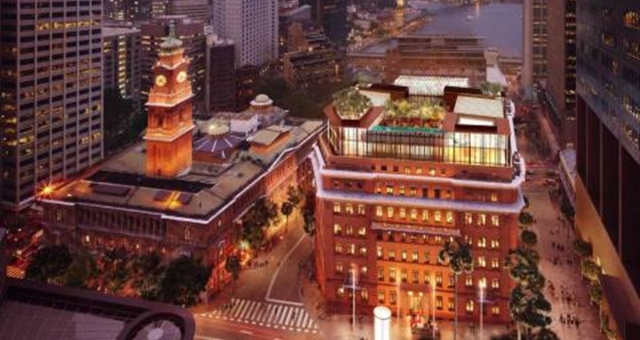The New South Wales Minister for Finance, Services and Property, Dominic Perrottet, has today (16 Sep) announced Pontiac Land Group as the purchaser of a long-term lease of Sydney’s Sandstone buildings (located at 23-39 Bridge Street) for redevelopment into a luxury hotel.
Perrottet said Pontiac Land would pay AUD$35 million for the lease, together with a commitment to undertake an estimated AUD$250 to AUD$300 million refurbishment of the assets, reflecting the high calibre of the bids after a competitive tender process.
“This is great news for NSW, with a 240-room luxury hotel to be built in Sydney’s tourism and financial hub, which means hundreds of new construction and hospitality jobs, and an estimated AUD$185 million boost to the NSW economy over 20 years,” he said.
“This flagship hotel is all about making smarter use of our property assets. Proceeds from the lease will be reinvested in infrastructure, and there will be substantial savings to NSW taxpayers on avoided maintenance. Importantly, these iconic heritage assets will be enjoyed by locals, tourists and visitors, rather than just being used as offices for bureaucrats.”
Pontiac Land is one of Singapore’s largest property developers, with a strong track record in luxury hotel development, including heritage conversions.
The company owns several luxury hotels in Singapore, including the Ritz-Carlton, Capella, Conrad and The Regent, and could potentially brand the property under any of them.
Pontiac Land Managing Director, Kwee Liong Keng, said: “We are delighted to work with Government Property NSW on the rare opportunity to convert the historic sandstone buildings into one of the finest luxury hotels in the world and a new benchmark for hotels and hospitality in Australia.
“Our approach to the project is guided by strong principles, including respecting and celebrating the Sandstones’ heritage and legacy, opening them up for visitors and locals, enhancing the surrounding public realm, and serving as long-term stewards of these treasured buildings,” Kwee said.
“This project symbolizes the Group’s ethos of making meaningful contributions to the urban landscape through art and architecture.”
The Sandstones are subject to the highest level of statutory heritage protection in NSW. Under the proposal, Government Property NSW retains custodianship of the Sandstones, and will apply its in-house heritage management expertise to oversee the transformation during the development approval and construction phases.
Pontiac Land will be responsible for obtaining all design and planning approvals, with construction expected to commence after the buildings are vacated in 2018, and the hotel anticipated to open about three years later.
The announcement has been welcomed by Tourism Accommodation Australia (TAA), but the body is calling on the NSW Government to crack down on the flood of unregulated short-term accommodation that is unfairly competing with Sydney’s hotels.
“This is great news for Sydney tourism and is part of a wave of new hotels and serviced apartments that are scheduled to be added in the city over the next five years,” says Carol Giuseppi, CEO of TAA.
“The new hotels will play a crucial role in supporting the launch next year of the new International Convention Centre and will help elevate Sydney into one of the world’s greatest business and tourism destinations.
“However, the cost of developing hotels in Sydney is extremely high and needs to be based on a sustainable se demand-led model if we are to continue to attract future investment.
“The new investment in our city is threatened by the spiralling increase in unregulated short-term accommodation – some within a few hundred metres of the sandstone buildings – which are operating contrary to strata, council and other rules.
“Investors in Sydney need to be confident that their hotel properties will be able to operate on a level playing field. It is estimated that there are over 10,000 rooms and apartments being made available for short-term rental across Sydney, many of which are operated as commercial businesses without the requisite permits. This is not good for future investors.
“These unregulated short-term commercial accommodation providers do not generally employ people, they don’t pay the appropriate council charges, there is a question about taxation, they often do not meet safety requirements and they contribute nothing to tourism promotion.
“In other words, they are not a sharing economy, they are a taking economy.
“With this exciting new project announced and other hotel developments in the pipeline we believe it is crucial that there is a review of rules and regulations to ensure future investment in the city’s tourism infrastructure is not jeopardised.”





